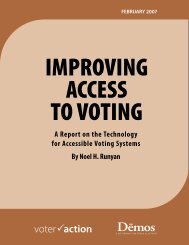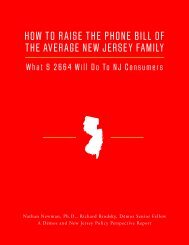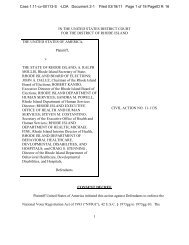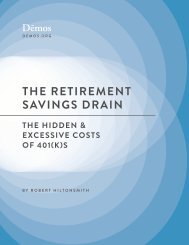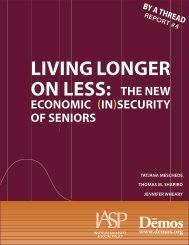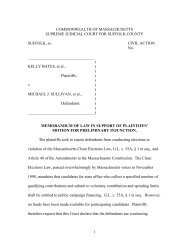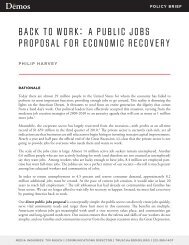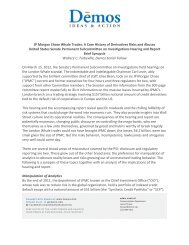Bullies at the Ballot Box - Demos
Bullies at the Ballot Box - Demos
Bullies at the Ballot Box - Demos
You also want an ePaper? Increase the reach of your titles
YUMPU automatically turns print PDFs into web optimized ePapers that Google loves.
voter to be kicked off <strong>the</strong> rolls without an opportunity<br />
to be heard.<br />
texas<br />
In Texas, any registered voter may challenge <strong>the</strong><br />
registr<strong>at</strong>ion of ano<strong>the</strong>r voter of <strong>the</strong> same county<br />
<strong>at</strong> a hearing before <strong>the</strong> registrar. 176 If <strong>the</strong> grounds<br />
for challenge is based on residence, it must be filed<br />
<strong>at</strong> least 75 days before <strong>the</strong> election o<strong>the</strong>rwise <strong>the</strong><br />
registrar will wait to follow <strong>the</strong> challenge procedures<br />
until after <strong>the</strong> election (unless <strong>the</strong> challenged voter<br />
submitted a registr<strong>at</strong>ion applic<strong>at</strong>ion after <strong>the</strong> 75 th<br />
day and prior to <strong>the</strong> 30 th day before <strong>the</strong> election,<br />
in which case this deadline does not apply). 177 For<br />
o<strong>the</strong>r grounds, Texas law provides no set timetable<br />
for when a challenge must be filed. The challenger<br />
must file a sworn st<strong>at</strong>ement th<strong>at</strong> st<strong>at</strong>es <strong>the</strong> specific<br />
qualific<strong>at</strong>ion for registr<strong>at</strong>ion th<strong>at</strong> <strong>the</strong> challenged voter<br />
has not met. 178 The challenge must be “based on <strong>the</strong><br />
personal knowledge of <strong>the</strong> voter desiring to challenge<br />
<strong>the</strong> registr<strong>at</strong>ion,” which could reduce <strong>the</strong> number of<br />
challenges by widespread caging campaigns so long as<br />
“personal knowledge” does not become a pro forma<br />
st<strong>at</strong>ement based on a cursory review of unreliable<br />
d<strong>at</strong>a. 179 Unfortun<strong>at</strong>ely, whe<strong>the</strong>r a voter may <strong>at</strong>tend a<br />
hearing before having her name removed from <strong>the</strong> rolls<br />
depends on <strong>the</strong> grounds for challenge. If <strong>the</strong> challenge<br />
is based on residence, <strong>the</strong> registrar is required to send<br />
a confirm<strong>at</strong>ion notice to <strong>the</strong> challenged voter. 180 If <strong>the</strong><br />
voter fails to send a response back to <strong>the</strong> registrar, <strong>the</strong><br />
registrar is mand<strong>at</strong>ed to place <strong>the</strong> challenged voter<br />
on <strong>the</strong> “suspense list” th<strong>at</strong> may ultim<strong>at</strong>ely result in<br />
a voter’s removal from <strong>the</strong> voter registr<strong>at</strong>ion rolls<br />
for failing to vote in subsequent elections. 181 If <strong>the</strong><br />
challenge is based on any ground o<strong>the</strong>r than residence,<br />
<strong>the</strong> registrar must hold a hearing on <strong>the</strong> challenge. 182<br />
virginia<br />
Virginia’s law is problem<strong>at</strong>ic in many respects as<br />
it applies to pre-Election Day challenges. First,<br />
challenges are based on whe<strong>the</strong>r a voter is “improperly<br />
registered.” 183 The law is not clear about wh<strong>at</strong><br />
makes a registr<strong>at</strong>ion improper but fortun<strong>at</strong>ely does<br />
exclude residency from a reason for challenge. 184 This<br />
significantly reduces <strong>the</strong> risk of challenges th<strong>at</strong> rely<br />
16 • <strong>Bullies</strong> <strong>at</strong> <strong>the</strong> <strong>Ballot</strong> <strong>Box</strong> | September 2012<br />
solely on challenges to residency, which are usually<br />
a product of flawed caging oper<strong>at</strong>ions, but it does<br />
not prevent challenges based on c<strong>at</strong>egories such as<br />
citizenship, age, or identity. The voter registr<strong>at</strong>ion<br />
challenge process requires ei<strong>the</strong>r <strong>the</strong> general registrar,<br />
or “any three qualified voters of <strong>the</strong> county or city”<br />
to make <strong>the</strong> challenge. 185 Ordinarily, in an election<br />
system without sophistic<strong>at</strong>ed caging and challenge<br />
oper<strong>at</strong>ions taking place in <strong>the</strong> st<strong>at</strong>e, this might present<br />
an important brake on <strong>the</strong> process, because it requires<br />
three voters to make <strong>the</strong> challenge, lessening <strong>the</strong><br />
risk of one sole bad actor challenging in bad faith.<br />
However, as voter caging becomes more sophistic<strong>at</strong>ed,<br />
with organiz<strong>at</strong>ions building caging teams th<strong>at</strong> rely<br />
on unreliable d<strong>at</strong>a in choosing whom to challenge, 186<br />
Virginia could be faced with many three-person<br />
challengers. Once challenged, <strong>the</strong> registrar is required<br />
by Virginia law to post <strong>at</strong> <strong>the</strong> courthouse or publish<br />
in a county or city newspaper <strong>the</strong> name of registered<br />
voters th<strong>at</strong> are to be cancelled by <strong>the</strong> general registrar.<br />
The list of names must be certified by <strong>the</strong> registrar and<br />
delivered to <strong>the</strong> county or city chair of political parties.<br />
Fortun<strong>at</strong>ely, Virginia law requires <strong>the</strong> registrar<br />
to send <strong>the</strong> challenged voter, by mail, <strong>the</strong> reasons for<br />
cancell<strong>at</strong>ion, facts upon which <strong>the</strong> cancell<strong>at</strong>ion is<br />
based, and a time <strong>the</strong> registrar will hear testimony for<br />
or against <strong>the</strong> right of a challenged voter to remain on<br />
<strong>the</strong> rolls. The hearing must be during regular hours<br />
and cannot occur earlier than ten days after mailing <strong>the</strong><br />
notice and “in no event within sixty days of <strong>the</strong> general<br />
election in November or within thirty days of any<br />
o<strong>the</strong>r election in <strong>the</strong> county or city.” 187 Unfortun<strong>at</strong>ely,<br />
a registered voter’s failure to appear and “defend his<br />
right to be registered” results in autom<strong>at</strong>ic cancell<strong>at</strong>ion<br />
of <strong>the</strong> voter’s registr<strong>at</strong>ion. 188 This is highly problem<strong>at</strong>ic.<br />
Virginia should establish failsafe mechanisms th<strong>at</strong> do<br />
not result in autom<strong>at</strong>ic cancell<strong>at</strong>ion based solely on a<br />
registered voter’s failure to appear <strong>at</strong> a pre-ordained<br />
hearing for which <strong>the</strong>y may not have received adequ<strong>at</strong>e<br />
notice or may legitim<strong>at</strong>ely not be able to <strong>at</strong>tend.




